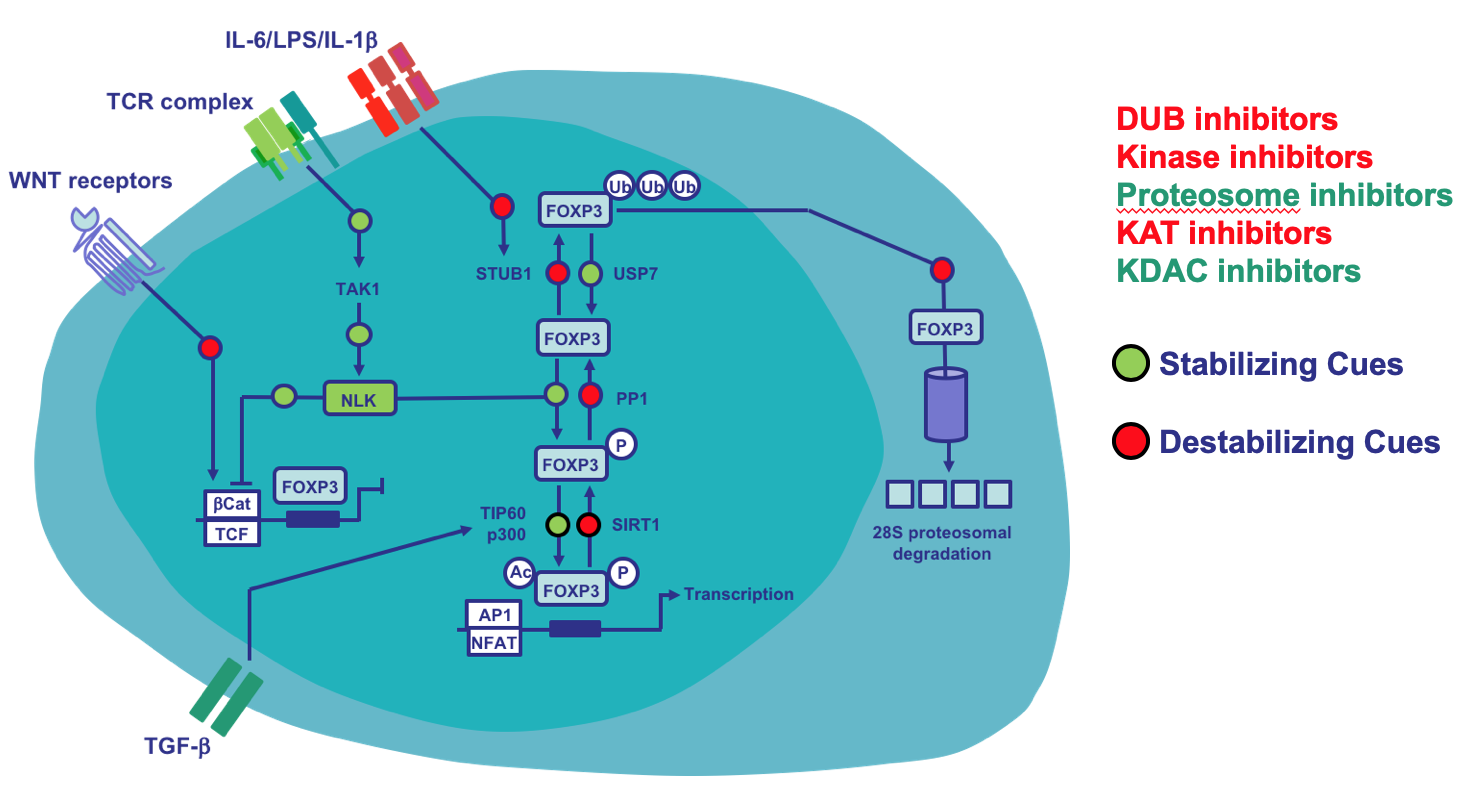The Foxp3 transcription factor is a crucial determinant of both regulatory T (Treg) cell development and their functional maintenance. Appropriate modulation of tolerogenic immune responses therefore requires the tight regulation of Foxp3 transcriptional output, and this involves both transcriptional and post-translational regulation. Here, we show that during T cell activation, phosphorylation of Foxp3 in Treg cells can be regulated by a TGF-β activated kinase 1 (TAK1)-Nemo-like kinase (NLK) signaling pathway. NLK interacts and phosphorylates Foxp3 in Treg cells, resulting in the stabilization of protein levels by preventing association with the STUB1 E3-ubiquitin protein ligase. Conditional Treg cell NLK-knockout (NLKΔTreg) results in decreased Treg cell-mediated immunosuppression in vivo, and NLK-deficient Treg cell animals develop more severe experimental autoimmune encephalomyelitis. Our data suggest a molecular mechanism, in which stimulation of TCR-mediated signaling can induce a TAK1-NLK pathway to sustain Foxp3 transcriptional activity through the stabilisation of protein levels, thereby maintaining TREG cell suppressive function. This work is a collaborative effort between our group and Dietmar Zaiss and has been driven by Veerle Fleskens (UMCU) and Carlos Minutti (University of Edinburgh) together with many important international partners. Part of a long-term research line we have identified a druggable Foxp3 stability circuit that could be used to modulate Treg cell activity in a variety of pathological situations. You can read more about this work here in Cell Reports.
Welcome to new PhD student Alessandro Cutilli
Alessandro Cutilli recently graduated from University of Padua (Italy) and has joined the Coffer Lab to work on a collaborative project together with Caroline Lindeman’s group focusing on CD4+ T cells in graft-versus-host-disease. Graft-versus-Host-Disease is the most life-threatening complication following allogeneic hematopoietic stem cell transplantation (HSCT) where patients are transplanted with a combination of donor hematopoietic stem cells and lymphocytes. Despite treatment and prevention strategies GvHD with intestinal and liver involvement still has around a 30% mortality rate and forms a large urgent unmet medical need. Transferred alloreactive T cells respond in a complex manner, and the reasons for induction of GvHD, while involving inappropriately targeted CD4+ T cell activation, remain largely unclear and difficult to predict. Devising strategies to transiently "inactivate" T cells that mediate unwanted immune responses will have important implications for the control GvHD after bone marrow transplantation. Existing therapies, such as steroid-treatment, tend to broadly suppress undesirable immune responses, are often ineffective, and can trigger a variety of unwanted side effects. This is particularly dangerous in transplant patients who are extremely susceptible to infection. One critical control mechanism that ensures peripheral T cells avoid inappropriate activation is the induction of anergy, a hyporesponsive-state where cells don’t proliferate or produce cytokines and are more resistant to subsequent stimulation. Our recent preliminary data has shown for the first time that it is possible to induce anergy in CD4+ T cell populations by inhibiting (macro)autophagy, even in hyperactivated cells. Alessandro will be further investigating this using complex in vitro 3D cell culture systems as part of the EU COFUND RESCUE consortium.
PhD survivor! Congratulations Dr. Janneke Peeters
Congratulations to Dr. Janneke Peeters who has successfully defended her PhD thesis entitled: “Transcriptional and epigenetic mechanisms underlying autoimmune diseases”.
Autoimmune diseases are complex and the various molecular mechanisms that contribute to autoimmune pathogenesis as still poorly understood. The work described in Janneke’s thesis is aimed to create insight into molecular mechanisms underlying autoimmune disease, focusing on epigenetic regulation and autophagy. These studies provide novel insight into transcriptional and epigenetic mechanisms in an autoimmune disease setting and demonstrate that altered enhancer regulation and autophagy is associated with autoimmunity. Furthermore, these findings indicate that targeting these molecular mechanisms might be of interest for the treatment of autoimmune diseases.
Janneke will soon be starting a postdoc position at University of California Berkeley with Dr. Michel DuPage where she will be utilizing sophisticated genetic tools to modify T cells and tumor cells in the context of pre-clinical cancer models.
Dutch Arthritis Society project funded!
Juvenile idiopathic arthritis (JIA) is a chronic autoimmune disease affecting up to 1/1000 children in Western countries. Like many autoimmune diseases, it is caused by a loss of tolerance whereby inappropriately active T cells in the joint help to generate a perpetuating inflammatory environment. Peripheral tolerance mechanisms regulating T cell function are essential to maintain immune homeostasis, and their deregulation can result in autoimmunity. Our unpublished observations demonstrate that effector T cells from the synovial fluid of JIA patients are resistant to induction of anergy, one of the peripheral mechanisms to maintain tolerance. Preliminary work by Enric Mocholi in the Coffer Lab has revealed that blocking autophagosome formation induces anergy in both peripheral blood healthy and JIA synovial fluid CD4+ T cells. We hypothesise that inhibition of autophagosome formation may provide a novel approach for controlling JIA, bearing in mind that this might also be applicable to other related (auto)immune diseases. With funding from ReumaNederland we are looking forward to taking this translatable work forward in 2019.
Transcriptional regulation of tumor-induced angiogenesis
The expression of the transcription factor SOX4 is increased in many human cancers, however, the pro-oncogenic capacity of SOX4 can vary greatly depending on the type of tumor. Both the contextual nature and the mechanisms underlying the pro-oncogenic SOX4 response remain unexplored. Here, we demonstrate that in mammary tumorigenesis, the SOX4 transcriptional network is dictated by the epigenome and is enriched for pro-angiogenic processes. We show that SOX4 directly regulates endothelin-1 (ET-1) expression and can thereby promote tumor-induced angiogenesis both in vitro and in vivo. Furthermore, in breast tumors, SOX4 expression correlates with blood vessel density and size, and predicts poor-prognosis in patients with breast cancer. Our data provide novel mechanistic insights into context-dependent SOX4 target gene selection, and uncover a novel pro-oncogenic role for this transcription factor in promoting tumor-induced angiogenesis. These findings establish a key role for SOX4 in promoting metastasis through exploiting diverse pro-tumorigenic pathways. This work, pioneered by Stephin Vervoort, Olivier de Jong, Cindy Frederiks and Guy Roukens is a collaboration between many groups within The Netherlands and the United Kingdom and is published in eLife here.
Regulation of oligodendrocyte differentiation by SOX4
SOX4 has been shown to promote neuronal differentiation both in the adult and embryonic neural progenitors. Ectopic SOX4 expression has also been shown to inhibit oligodendrocyte differentiation in mice, however the underlying molecular mechanisms remain poorly understood. Here we demonstrate that SOX4 regulates transcriptional targets associated with neural development in neural stem cells (NSCs), reducing the expression of genes promoting oligodendrocyte differentiation. SOX4 levels decreased during oligodendrocyte differentiation in vitro while SOX4 knockdown induces increased oligodendrocyte differentiation. Conversely, conditional SOX4 overexpression decreases the percentage of maturing oligodendrocytes, suggesting that SOX4 inhibits maturation from precursor to mature oligodendrocyte. We identify the transcription factor Hes5 as a direct SOX4 target gene and we show that conditional overexpression of Hes5 rescues the increased oligodendrocyte differentiation mediated by SOX4 depletion in NSCs. Taken together, these observations support a novel role for SOX4 in NSC by controlling oligodendrocyte differentiation through induction of Hes5 expression. This work was performed by Luca Braccioli as part of his thesis project in the Coffer Lab and has been published in Stem Cell Reports.
The role of WNT signaling in mature T cells: TCF Is coming home
T cell factor, the effector transcription factor of the WNT signaling pathway, was so named because of the primary observation that it is indispensable for T cell development in the thymus. Since this discovery, the role of this signaling pathway has been extensively studied in T cell development, hematopoiesis, and stem cells; however, its functional role in mature T cells has remained relatively underinvestigated. Over the last few years, various studies have demonstrated that T cell factor can directly influence T cell function and the differentiation of Th1, Th2, Th17, regulatory T cell, follicular helper CD4+ T cell subsets, and CD8+ memory T cells. In a recent review paper in Journal of Immunology with Jorg van Loosdregt, we discuss the molecular mechanisms underlying these observations and place them in the general context of immune responses. Furthermore, we explore the implications and limitations of these findings for WNT manipulation as a therapeutic approach for treating immune-related diseases. You can find out more here.
Forkhead box transcription factors as context-dependent regulators of lymphocyte homeostasis
Lymphocytes have evolved to react rapidly and robustly to changes in their local environment by using transient adaptations and by regulating their terminal differentiation programmes. Forkhead box transcription factors (FTFs) can direct leukocyte-specific responses, and their functional diversification promotes a high degree of context-dependent specification. Many, often antagonistic, FTFs have overlapping expression patterns and can thereby compete for binding to the same chromosomal target sequences. Multiple molecular mechanisms also connect extracellular signals to the expression and functionality of specific FTFs and, in this way, fine-tune their activity. Through these diverse mechanisms, FTFs can function as context-dependent rheostats responding to diverse environmental stimuli. Focusing on the various mechanisms by which their functional activity is modulated, as well as on their mechanisms of action, we discuss how specific FTFs control lymphocyte function, allowing for the establishment and maintenance of immune homeostasis. This review, written together with Dietmar Zaiss (University of Edinburgh) has been published in Nature Immunology Reviews.








